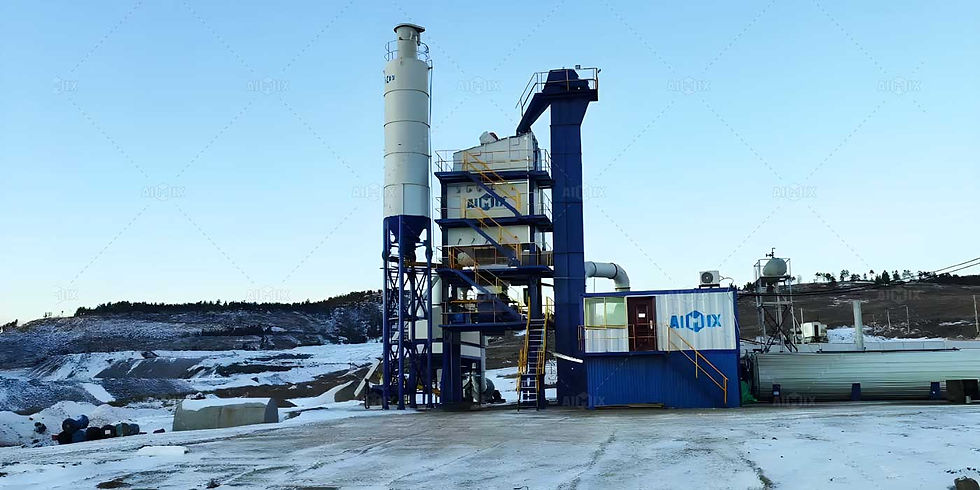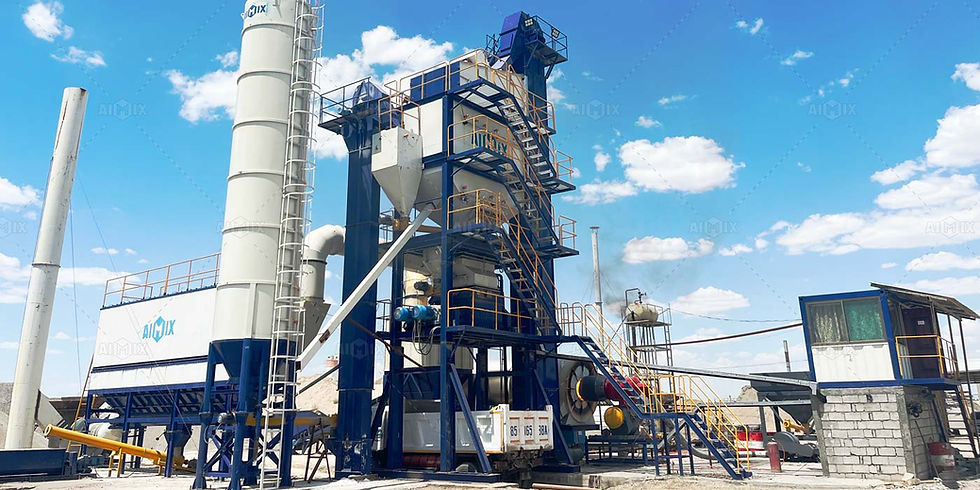What Are the Key Features to Look for in an Asphalt Plant When Producing High-Quality Asphalt Mixtures for Bridges and Highways?
- aimixglobal5
- Apr 29, 2025
- 3 min read
When planning the construction of bridges and highways, the quality of the asphalt mixture plays a pivotal role in the project’s durability and performance. Selecting the right asphalt plant is crucial to ensure that the produced asphalt mixture meets the required standards. In this post, we’ll explore the essential features to look for in a plant mix asphalt to produce high-quality asphalt mixtures that are perfect for these heavy-duty projects.

1. Consistent Production Quality
One of the most critical aspects of any asphalt plant is the ability to consistently produce high-quality asphalt mixtures. For bridges and highways, consistency is key. An asphalt hot mix plant that offers precise control over the mixing process ensures uniformity in the final product. This consistency helps maintain the strength, durability, and longevity of the asphalt, even under extreme weather conditions and heavy traffic loads.
It’s important to look for plants with advanced digital control systems that allow operators to fine-tune and monitor the mixing process. Features like automatic temperature control, material flow regulation, and real-time quality monitoring are essential for maintaining the desired mix consistency.
2. Efficient Fuel Consumption and Low Emissions
Given the environmental impact of construction, many customers are increasingly prioritizing energy-efficient solutions. An asphalt plant that uses less fuel not only reduces operational costs but also minimizes its carbon footprint. Efficient fuel consumption is particularly important when producing asphalt for large-scale projects like bridges and highways, which require significant amounts of asphalt.
Look for asphalt plants that incorporate modern combustion technology, such as multi-fuel burners and energy recovery systems. These features help improve fuel efficiency and reduce harmful emissions. Low emissions are essential for meeting environmental regulations and ensuring that your projects have minimal environmental impact.

3. Flexibility in Material Handling and Mix Design
The asphalt used in bridges and highways must meet specific requirements for strength and durability. Therefore, the flexibility of an asphalt plant to handle different materials and mix designs is crucial. A good asphalt batch plant should be able to handle various aggregates, binders, and additives to meet diverse specifications.
Plants with multiple cold feed bins, different mixing technologies, and customized mix designs give operators the ability to adjust the production process as needed. Whether it's for a high-performance mixture or a more standard blend, flexibility in material handling ensures that the asphalt is suited to the specific needs of the project.
4. Advanced Asphalt Plant Technology
Technology has revolutionized the asphalt industry, and staying up to date with the latest advancements can greatly benefit any construction project. Asphalt plants equipped with advanced technology offer better precision, enhanced monitoring capabilities, and improved automation, all of which lead to higher-quality output.
Features such as automated production control systems, real-time reporting, and remote monitoring ensure that operators can optimize production efficiency. Additionally, the ability to integrate plant systems with project management software helps streamline operations, improving overall workflow and minimizing delays in large-scale projects like bridges and highways.

5. Easy Maintenance and Durability
Asphalt plants that require frequent repairs or have short lifespans can result in downtime, delays, and increased costs. It is essential to select a plant that is built for durability and offers easy maintenance solutions. This ensures that the plant operates efficiently over its entire lifecycle, minimizing unplanned stoppages and repair costs.
Look for asphalt plants that feature corrosion-resistant components, easy-to-replace parts, and user-friendly maintenance schedules. A reliable service network and availability of spare parts are also essential to ensure smooth operation throughout the plant’s lifespan.
6. Cost-Effectiveness and Return on Investment
While investing in a high-quality asphalt plant may involve a significant upfront cost, it is important to consider the long-term savings and returns. Plants that offer efficient production, low operational costs, and reduced maintenance expenses deliver the best return on investment over time. Moreover, a well-designed plant with low fuel consumption and high-quality output minimizes waste and improves overall project profitability.
Evaluate the total cost of ownership, including initial purchase cost, operating expenses, and the expected lifespan of the plant, to ensure that you are making a financially sound investment for your bridge or highway project.

Conclusion: Choose the Right Asphalt Plant for Your Project
When working on bridges and highways, the quality of asphalt used in construction is non-negotiable. To ensure that your projects meet the highest standards, selecting the right asphalt plant is critical. Look for plants that offer consistent production quality, fuel efficiency, material handling flexibility, advanced technology, durability, and cost-effectiveness.
At AIMIX, we provide a range of asphalt plants designed to meet the specific needs of large-scale construction projects like bridges and highways. Our plants are equipped with cutting-edge technology, ensuring the highest quality asphalt mixtures for your projects. Contact us today to learn more about how our asphalt plants can benefit your next construction project.



Comments